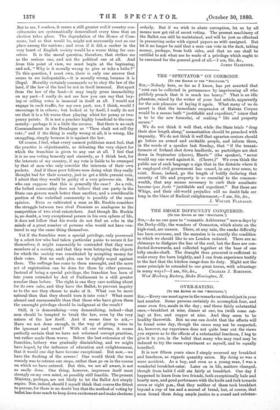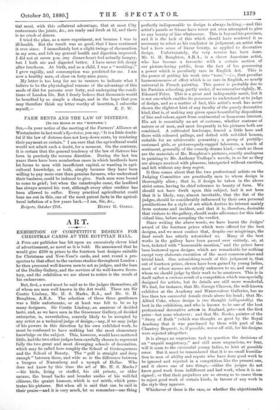OVER-EATING-.
[TO THE EDITOR OF THE SPECTATOR.")
Sin,—Every one must agree in the remarks on this subject in your last number. Some persons certainly do accomplish four, and some even five, meals in the day ; and those fairly substantial ones,—breakfast at nine, dinner at one, tea (with some eat- ing) at five, and supper at nine. And they seem to be healthy therewith. But no one can doubt that the effects will be found some day, though the cause may not be suspected. As, however, my experience does not quite bear out the views you express as to the effects of a substantial luncheon, I beg to give it to you, in the belief that many who may read may be induced to try the same experiment as myself, and be equally benefited.
It is now fifteen years since I simply reversed my breakfast and luncheon, as regards quantity eaten. My doing so was a mere accident. As a boy, and even as a young man, I was a wonderful breakfast-eater. Later on in life, matters changed, though from habit I still ate fairly at breakfast. One day I happened to learn from two friends, both exceptionally hale and hearty men, and good performers with the knife and fork towards seven or eight p.m., that they neither of them took breakfast beyond a cup of tea and a morsel of bread, but, of course, that noon found them doing ample justice to a sound and substan- tial meal, with this collateral advantage, that at most City restaurants the joints, ez.c., are ready and fresh at 12, and there is no crush of diners.
I tried the plan, as a mere experiment, not because I was in ill-health. But the result was so good, that I have continued it ever since. I immediately lost a slight twinge of rheumatism in my arm, and felt my general health and digestion improved. I did not at seven p.m. (my dinner-hour) feel actually hungry, but I both ate and digested better. I have never felt sleepy after luncheon. At birth, and as a child, I was a "weakling ;" I grew rapidly, and consumption was predicted for me. I am now a healthy man, of close on forty-nine years.
My letter is too long for me to venture to indicate what I believe to be the physiological reasons of the advantage of this mode of diet for persons over forty, and undergoing the condi- tions of London life. But I firmly believe that thousands would be benefited by so simple a change, and in the hope that you may therefore think my letter worthy of insertion, I subscribe







































 Previous page
Previous page